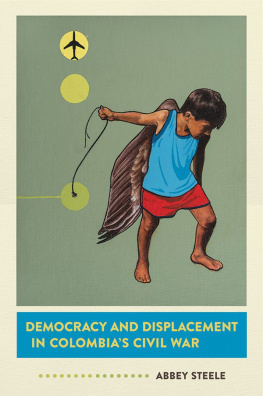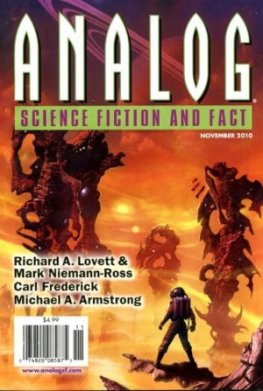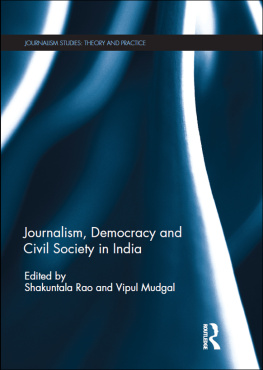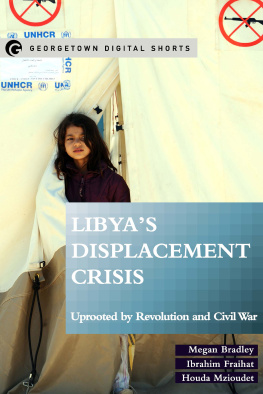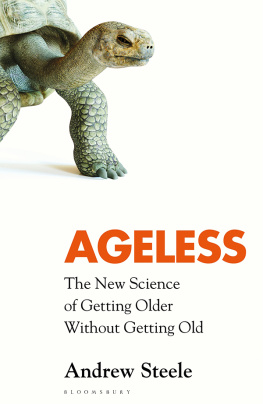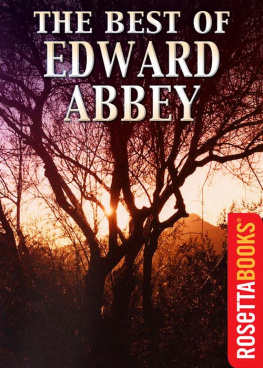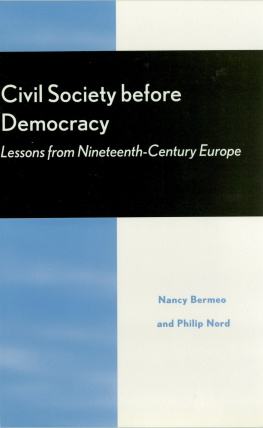Preface
I arrived in Colombia for the first time in January 2002. That year, friends and I started an informal workshop with teenagers in Altos de Cazuc, to the south of Bogot. The thousands of residents come from all over the country and construct the least flimsy houses they can manage, clinging to the foothills of the central chain of the Andes. Many of them are displaced, victims of the civil war. I wondered what brought the families to the neighborhood, aspirationally named El Progreso, or Progress. Where were they all from? Why did they come to El Progreso? Who did they leave behind? Would they ever return? But I was too shy to ask, worried that I would make everyone uncomfortable.
Only one month after I arrived, the peace talks that had started three years earlier between the government and the FARC, Colombias largest insurgency, fell apart. Bogot buzzed with nervousness about the possibility of a terrorist attack by the FARC. One finally came months later, at the inauguration of newly elected president lvaro Uribe in August. The mortars killed fifteen and injured forty more.
Once a week, I took an evening class at the venerated Universidad Nacional, where the main campus plaza features an image of Che Guevara. My class, taught by Donny Meertens, was held in a magnificent building designed by Rogelio Salmona, one of the few on campus left free of the fuera gringos and Camilo Torres, presente graffiti. More than once I arrived on campus to find the gates locked; student protests occasionally led to shutdowns. Once, an abandoned police tank remained, facing the campus gates.
Even with the uncertainty following the end of the peace talks and the twitchy energy of the city, Bogot still felt distant from the war. We were ensconced on a high-altitude plateau (nearly three thousand meters high) and told by US embassy officials not to risk traveling by road outside of the city. That year, I took flights to visit other cities: Cal, Cartagena, Barranquilla. But rather than travel to areas more directly affected by the war, the closest I got was by talking to the people arriving in the cities, displaced from their homes, their land, and their communities and in many cases barely eking out new lives in unstable houses and strange cities.
When I returned to Colombia to start my fieldwork in 2006, my focus was on understanding the causes of displacement. This time, though, I finally visited places that experienced the war directly. The Urab region experienced an early, intense onslaught of violence, but was relatively calm in 2007. Still, I should have taken more precautions than I did. I traveled alone on public transportation, only sometimes remembering to let friends in Bogot know where I was. I let strangers guess where I was from rather than present a consistent story, because I found it difficult to come up with something that sounded credible. It was a reckless choice. Once, improbably, the driver of the jeep transport (the areas answer to a bus, for all the unpaved roads) guessed I was from Bogot (do your parents know you are here?). I visited a rural area where an acquaintances father met me and took me to a bar at ten in the morning, where I was thankful I could substitute beer for the anise-flavored national liquor aguardiente he urged me to drink. When I met one of the people I wanted to interview, my contact introduced me as his European daughter-in-law (which I later tried to correct in private).
In spite of my missteps, I found that the region was vibrant with engaged residents who were willing to speak with me at great length about their experiences. Many spoke with pride about their past roles in developing the city of Apartad, establishing labor regulations, and building the banana economy. I also visited Medelln to try to track down people who left Urab and take account of their stories too. I met many with the help of NGOs like Cedecis, which works in the comunas that crawl up the mountains surrounding the city. The hardest part of this work was to ask for peoples time away from work and family and to ask them to share their painful stories, knowing that I would not be able to offer much at all in return.
I hope their sacrifices were not in vain; I hope this book reflects their experiences faithfully. I also hope it can illuminate displacement patterns in civil wars, especially Colombias. Though the findings are harrowing, maybe they can contribute to ongoing efforts for justice and peace in the country.
This book has the imprint of many people, to whom I am incredibly grateful. First, I acknowledge the countless people in Colombia who made this work possible. Most of all, I am indebted to the hundreds of people who graciously shared their stories. Enilda Jimnez, Mario Agudelo, and William Forero were exceedingly generous; I hope I captured the essence of their insights and memories. Donny Meertens, Jorge Restrepo, Mauricio Romero, Consuelo Valdivieso, and Pedro Valenzuela provided supportive guidance in Bogot. I am grateful especially to Ana Mara Ibez and Fabio Snchez, who welcomed me to the Centro de Estudios de Desarrollo Econmico (CEDE) at the Universidad de los Andes and its lively environment during my stays in Bogot and who always helped me track down the data I needed or shared their own. Andrs Gmez, Lizeth Herrera, Gloria Lema Vlez, and Nidia Montoya were extremely helpful in Medelln. Ana Aldana, Mariana Blanco, Valentina Caldern, Juan Espinosa, Carolina Gmez, Luisa Lema Vlez, Claudia Lpez, Andrs Mesa, Alf Onshuus, Eli Prado, Sal Snchez, Rebecca Tally, Harold Tenorio, and Juan Vargas offered levity, wisdom, and friendship and made Bogot a second home for me.
Many more people equipped me with the tools to try to understand the stories I was collecting, and displacement and politics. My greatest intellectual debt is to Stathis Kalyvas, who profoundly influenced how I think. I am the social scientist I am because of him. Libby Wood was an incredible mentor in the classroom and in the field, consistently inspiring me to try to be a better scholar and a better person. I would have been extremely fortunate to have either Stathis or Libby as an adviser; it is hard to fathom how lucky I was to have both. The broader community at Yale was invaluable, too. Adria Lawrence and Matt Kocher were confidants who not only influenced how I think but also boosted me at critical times. Sue Stokes pushed me to think beyond Colombia and civil wars. Pierre Landry and Ian Shapiro encouraged and supported me as well. The Comparative Politics Workshop, and the Order, Conflict and Violence community shaped the kind of political scientist I am. I am also very grateful to Jake Shapiro, who offered me the chance to continue my research in Colombia as a postdoctoral fellow. His seemingly ceaseless energy and sharp insights pushed me to work harder and, hopefully, to greater effect.

